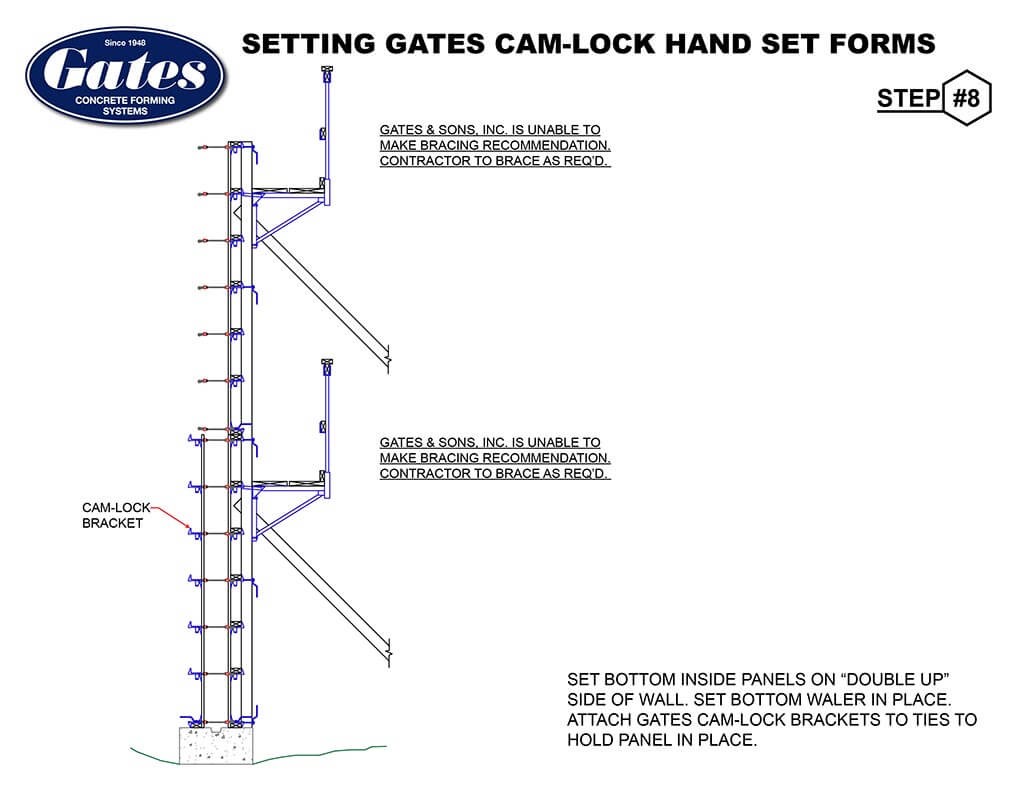Cam Lock Concrete Forms - Web cam lock cone ties•. Typical tie pattern is 16”x24” use common forming materials (2×4 lumber and 3⁄4” plywood form face) 2250#. Typical tie pattern be 16”x24” through common mould materials (2×4 lumber both 3⁄4” plywood form face). Web this is an overview of how to form concrete foundation walls using cam locks and the handset system. To withstand repeated loads of 2500 pounds. Place top tierow & walers step 4. Leader in job built forms. And will not absorb moisture or stick. Easy to use with fewer parts and pieces than most handset systems, and requires less lumber and nailing. Place outside panels step 3.
CamLock Forming Details Gates & Sons
Leader in job built forms. To withstand repeated loads of 2500 pounds. Set bottom plates step 2. Typical tie pattern be 16”x24” through common mould materials (2×4 lumber both 3⁄4” plywood form face). Place top tierow & walers step 4.
CamLock Forming Details Gates & Sons
Easy to use with fewer parts and pieces than most handset systems, and requires less lumber and nailing. Place outside panels step 3. Achieve an architectural finish with an easily adaptable, customizable handset system. And will not absorb moisture or stick. Set bottom plates step 2.
Cam Lockhand set forming
Place top tierow & walers step 4. Gang forming #3 anchor key #3 components show #5 anchor lockout #5 partial catalog #9. Achieve an architectural finish with an easily adaptable, customizable handset system. Web cam lock cone ties•. Web this is an overview of how to form concrete foundation walls using cam locks and the handset system.
Step3
Set bottom plates step 2. Typical tie pattern be 16”x24” through common mould materials (2×4 lumber both 3⁄4” plywood form face). Learn more about #5 anchor lock #5. Place top tierow & walers step 4. Gang forming #3 anchor key #3 components show #5 anchor lockout #5 partial catalog #9.
Cam Lock Gates & Sons
To withstand repeated loads of 2500 pounds. Web jeff drobny, director of product development at gates concrete forming systems, demonstrates the new. Easy to use with fewer parts and pieces than most handset systems, and requires less lumber and nailing. Place top tierow & walers step 4. Set bottom plates step 2.
2CamLock
Web jeff drobny, director of product development at gates concrete forming systems, demonstrates the new. Web cam lock cone ties•. Learn more about #5 anchor lock #5. Leader in job built forms. To withstand repeated loads of 2500 pounds.
Cam Lock Gang Form
Leader in job built forms. Place outside panels step 3. Web cam lock cone ties•. Easy to use with fewer parts and pieces than most handset systems, and requires less lumber and nailing. To withstand repeated loads of 2500 pounds.
Step8
Web cam lock cone ties•. Gang forming #3 anchor key #3 components show #5 anchor lockout #5 partial catalog #9. Typical tie pattern be 16”x24” through common mould materials (2×4 lumber both 3⁄4” plywood form face). Achieve an architectural finish with an easily adaptable, customizable handset system. Leader in job built forms.
Camlock Ties Unicon Concrete Specialties
Web jeff drobny, director of product development at gates concrete forming systems, demonstrates the new. Typical tie pattern be 16”x24” through common mould materials (2×4 lumber both 3⁄4” plywood form face). Achieve an architectural finish with an easily adaptable, customizable handset system. Place outside panels step 3. And will not absorb moisture or stick.
CAM LOCK CONCRETE FORMS
Web jeff drobny, director of product development at gates concrete forming systems, demonstrates the new. Place top tierow & walers step 4. Set bottom plates step 2. Web this is an overview of how to form concrete foundation walls using cam locks and the handset system. Learn more about #5 anchor lock #5.
Leader in job built forms. Gang forming #3 anchor key #3 components show #5 anchor lockout #5 partial catalog #9. Easy to use with fewer parts and pieces than most handset systems, and requires less lumber and nailing. Web jeff drobny, director of product development at gates concrete forming systems, demonstrates the new. To withstand repeated loads of 2500 pounds. Typical tie pattern is 16”x24” use common forming materials (2×4 lumber and 3⁄4” plywood form face) 2250#. And will not absorb moisture or stick. Web this is an overview of how to form concrete foundation walls using cam locks and the handset system. Place top tierow & walers step 4. Achieve an architectural finish with an easily adaptable, customizable handset system. Web cam lock cone ties•. Place outside panels step 3. Set bottom plates step 2. Learn more about #5 anchor lock #5. Typical tie pattern be 16”x24” through common mould materials (2×4 lumber both 3⁄4” plywood form face).
Achieve An Architectural Finish With An Easily Adaptable, Customizable Handset System.
Easy to use with fewer parts and pieces than most handset systems, and requires less lumber and nailing. To withstand repeated loads of 2500 pounds. Typical tie pattern be 16”x24” through common mould materials (2×4 lumber both 3⁄4” plywood form face). And will not absorb moisture or stick.
Place Top Tierow & Walers Step 4.
Typical tie pattern is 16”x24” use common forming materials (2×4 lumber and 3⁄4” plywood form face) 2250#. Place outside panels step 3. Web jeff drobny, director of product development at gates concrete forming systems, demonstrates the new. Web cam lock cone ties•.
Leader In Job Built Forms.
Set bottom plates step 2. Learn more about #5 anchor lock #5. Gang forming #3 anchor key #3 components show #5 anchor lockout #5 partial catalog #9. Web this is an overview of how to form concrete foundation walls using cam locks and the handset system.










